Operating costs are increasing at an unrelenting pace, leaving retailers with little choice but to boost margins just to stand still. Here C-Store looks at how store owners and their symbol groups are working together to maximise the potential return from every shopping visit
Operating costs are rising with the inevitability of night following day. The National Living Wage alone is set to rise by 4.9% to £8.21 per hour next April. Not many retailers can boast of 5% annual sales growth to counteract higher wages bills.
Then, of course, there’s energy, business rates, rent, and even crime, to name a few. To counter escalating costs, retailers have been reducing staff hours and investing in technology. But there comes a time when you’ve exhausted all streamlining options: ultimately, the secret to moving your business forward is by increasing margins. Premier brand manager Martyn Parkinson says: “When the National Living Wage goes up retailers will have to make £500-£800 more per week just to stand still.”
Spar retailer Richard Barron, who owns six stores in the Chesterfield area, says he can no longer reduce his wage bill any further. “My wages go up each year by about £45,000 - the first year of the National Living Wage we were able to cover that increase by cutting back on hours and seeing where we could run with what we missed. Last year they went up again by £45,000, and the rates went up, and electricity went up.
“You do anything you can to save money - we put LED lighting in, doors on chillers. Regarding the wage bill, you’ve already done that two years earlier so there’s nothing you can do,” he says.
For Jeeta Bhadal, who owns One Stop and Londis stores with his two brothers in Leeds, an increase in shoplifting - directly resulting from police cuts, he believes - has also added to the cost burden. “The importance of margins has most definitely increased. Everything is going up, including the cost of waste collections. But a major reason why we need to increase margins is the cost of theft, which has gone up tenfold over the past couple of years.”
Shailesh Parekh, owner of six Nisa forecourt stores in the West Midlands, agrees the focus is now on margins: “Lately we have all been under pressure to increase our
margins because of various increases in costs, especially the minimum wage and business rates.”
Blakemore Trade Partners sales director Neil Mercer believes boosting margins is essential just to survive nowadays. “It’s vital to boost margins. We think 0.5% is required just to absorb cost rises such as the NLW and utility increases. A further 0.5% is needed to enable retailers to keep investing and moving forward,” he explains.
At its annual show in September, Blakemore Trade Partners pledged to help its independent Spar retailers lift their margins by 1% every year. In addition to its policy of co-investing with store owners, the Spar distributor has recently taken action on its fresh offer to raise standards and drive up margins. “With fruit and veg we’re changing the mix and ensuring minimum 25% margins,” says Mercer. “We’re doing smaller cases, focusing on 10 core products, so small stores can get involved. We’ve worked on the commercials with the suppliers.”
Blakemore has also introduced a new premium Tonight’s Tea range, sourced from suppliers used by Hendersons, the Northern Ireland Spar distributor. “Their fresh requirements are greater than ours over there,” Mercer explains. “The quality of the products is fantastic - up there with M&S and Waitrose. We’re putting Spar in the same boat.” The range offers a £10 meal deal for two, with margins of up to 30%. The Tonight’s Tea range is now implemented in about 150 Blakemore-supplied stores, and is suitable for about 60% of the Spar estate, he adds. “With those other stores it’s about helping them with food to go. We’re really focusing on food to go and availability in smaller stores.”
New territory
Richard’s store in Newbold Road, Chesterfield, introduced the Tonight’s Tea range after the store was selected by Blakemore as a testbed for a new store format aimed at raising turnover and margins.
“The only way we can increase our margin is to bring in other departments we didn’t have before: more fresh, it’s all about fresh. This is the first store Blakemore did, along with another in South Wales,” he says.
As well as expanding fresh and chilled, Richard halved his ambient grocery range while bringing in more on-trend products such as pasta sauces and Mexican lines. Despite slashing the category by 50%, sales of ambient grocery have increased by 15%.
Food to go, which has doubled, now includes a Country Choice Tuk Tuk counter that cooks pasta or rice bolognese in minutes, a milkshake machine, a combi oven, and a Costa coffee machine for the first time.
Richard has also significantly increased the store’s gin range to up to 20 lines, some of which are sourced from outside Blakemore.
Overall sales and margins are healthy, but sales of BWS are up 25% because of the new customers attracted by the higher store standards, Richard says.
Nisa retailers now have access to more than 700 lines from Co-op, and Nisa is working closely with them to demonstrate how to achieve the best margins from these ranges, says retail director Nigel Gray. In addition, Nisa fresh food development managers work directly with Nisa retailers “to ensure they are stocking the right range for their shoppers and we are experiencing strong like-for-like growth because of this,” he adds.
Shailesh says margins on some of the Co-op own-brand products are up to 30-40%, with own-brand crisps, spirits and wines selling particularly well.
Gray adds that Nisa hosted a study tour to Northern Ireland this year for some of its larger retailers to showcase the best food to go and freshly-made-in-store products. “This inspired many to develop new offers in their own stores and identify opportunities for their businesses,” he says.
Nisa member Proudfoot Group launched its own ready meal range, Simply Cook, after visiting Northern Ireland. “We knew we could start it up quite easily here using our own meat and our own production area, and were very keen to give it a go. We spent a lot of time creating recipes as well as designing the packaging and the Simply Cook label,” says director Valerie Aston.
Elsewhere, Premier unveiled its latest store format in Hull in the summer, with its focus on food to go, premium coffee and on-trend categories such as craft gin and American confectionery aimed at lifting margins. Joe Punian, owner of the store in Victoria Dock, has seen margins increase by three percentage points to about 23% since re-opening earlier in the year. “That extra 3% margin makes a crucial difference, and I’ve been surprised by the success of food to go and coffee, as well as all the fresh and chilled from Booker,” he says.
The store also sells products not usually associated with Premier stores, such as Quorn vegetarian lines, which are selling at about 30 a week.
“Vegetarian/vegan/gluten free will attract more shoppers and are not price sensitive,” Premier brand manager Parkinson says.
Local products are another option that shoppers will place a premium on “and now expect to see local growers and producers supported in the local area,” he adds. “Bakery and beer are the two key areas.” Both Richard and Joe tick both of those boxes.
Over in Leeds, Jeeta is overcoming cost hikes with improved margins, thanks to help from his franchise group. “One Stop is introducing more and more own brand, which has higher-than-average margins. The proportion of own brand has increased a lot over the past couple of years. There’s now a lot more pasta sauces, which are better margin than Dolmio - up to about 30% - as well as biscuits, custard creams and cookies.”
He says One Stop has just introduced a new high-margin free-from range, while he has recently started sourcing fruit and veg locally “which has vastly improved our margins”.
Goran Raven, owner of Raven’s Budgens in Abridge, Essex, says his “partnership” with Budgens has resulted in him stocking additional lines from outside brand owner Booker’s supply. Goran’s Regional Development Manager suggested he offered Laithwaite’s wine and Cook premium ready meals, and both have proven a success. “We identified how it would complement the core range. We look at things through the eyes of a retailer, none of my team come here to help sell you stuff,” says Budgens brand director Mike Baker.
The same applies to free-from lines. “We’re bringing in a lot more brands that are gluten-free and vegan, such as Kirsty’s ready meals (vegan). We need to be at the forefront of these trends,” he adds. Budgens has also continued to expand its Discover the Choice ready meal skus since launching a year ago, with a new dessert range recently introduced. “It took a while to convince people about the Discover the Choice brand. Now they ask for it by name,” Goran says.
While many retailers are benefiting from their symbol groups and suppliers to help increase margins, others have enjoyed an instant margin boost simply by switching suppliers. For Lia Rutter, who owns three Bargain Booze stores in Macclesfield, the decision was out of her control. The unexpected and sudden collapse of brand owner Conviality Retail led to Bestway Wholesale snapping up the company in April this year - in a move welcomed by Lia.
“We’ve got lower wholesale costs now that we’re being supplied by Bestway. Now we’ve got fresh, chilled and frozen deliveries. And Best-one own-label products are higher margins - up to 40%. In one of our stores, which is lower demographic, it’s all own brand,” she says.
“What also really helps is that we can source 10% from outside,” Lia adds. In Thornton Square, which has a more affluent customer base, she has used that leeway to hone her impressive craft gin range - offering the store a point of difference and the retailer potent margins. “We have 185 different lines on a bespoke fixture. And Bestway has massively extended its gin range anyway,” she says. “In our other stores we use that flexibility for stunt deals.”
Middlesbrough retailer Bay Bashir moved to Parfetts’ Go Local fascia after the wholesaler bought Blakemore Wholesale’s nearby depot. Buying prices are now 5% cheaper which, given he owns five stores, makes a significant difference to his bottom line. “The Parfetts pricing is unbelievable,” he says. “You get 5% from your stores coming back into your pocket, you feel that. That relates to your figures, your cash flow, everything.”
Bay has also introduced a Rijo42 coffee machine in one store, offering up to 400% margin, and high-margin Tango Ice Blast machines in other stores, which is proving an all-season sensation.
It is clear that many retailers and their suppliers are successfully collaborating to drive up margins, although Goran stresses that if you follow best practice, then the margins will follow. “If you’re process driven, it’ll happen. Let’s do it correctly, and the net result is there.”
Simple tips to boost margins

“Don’t be too scared to increase your margins by simply putting up the price. Sometimes you just have to do it. You should always go and have a look at your local Tesco and you’ll be surprised at the prices with which they sell things. Sometimes they are far more than what you charge.
“Do a little survey and put prices up on the things you can. Try to avoid putting prices up on Known Value Items (KVIs), like milk and bread.
“The other thing I’ve done is I’ve stopped putting all promotions together. I put them among other goods in the same category - or among goods that can be cross-merchandised. For example, if you have high margin bags of peanuts, they should be with the promotion of a 10-pack of beer.
“Thirdly, watch your traffic flow. I’ve noticed that people tend to buy things at the end of a chiller run, towards the cashier. Try and put your high margin, more expensive sandwiches at eye level towards the end, nearer the cashier. You can apply this principle to anything you have in the chillers and you’ll find you increase your turnover and your margin.”
Shailesh Parekh, owner of six Nisa forecourt stores
Londis Woodhouse, Leeds
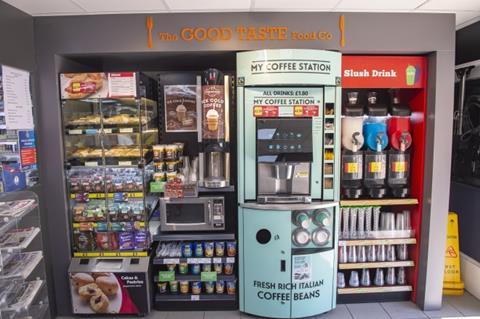
Londis Woodhouse in Leeds has seen margins rise by 30% since updating to the symbol group’s latest store format.
The format provides greater prominence to food to go, coffee and emerging food trends, while more space has been created by removing a gondola and 300 lines of ambient grocery.
Eye-catching POS highlights value and health benefits of particular products, including ‘sugar-free soft drinks’, ‘gluten free’, ‘free from’ and ‘protein’ lines. An American confectionery fixture also caters to the large student demographic.
The backlit gantry now accommodates an extensive spirits range, including a number of premium lines, with tobacco now stocked in drawers under the till.
Londis brand director Martin Swadling says: “Traditional footfall drivers are in decline, so we wanted to make food to go and coffee prominent and smart when you walk in the store.”
Londis’ new food-to-go portfolio also offers increased margins, he adds, while the store format is also helping retailers take advantage of high-margin trends such as craft beer, premium spirits and protein.






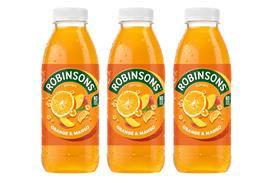
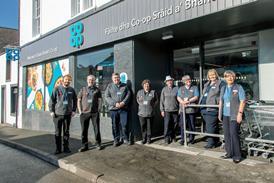

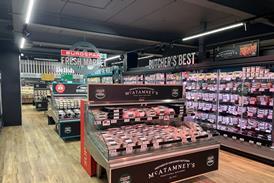

![WG-4003[58]](https://d2dyh47stel7w4.cloudfront.net/Pictures/274x183/4/5/1/353451_wg400358_6083.jpg)




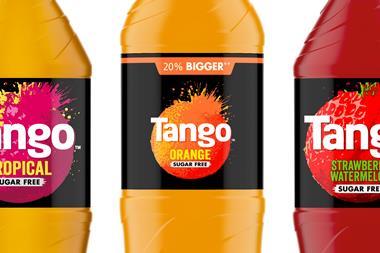



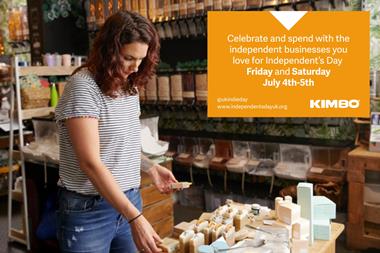
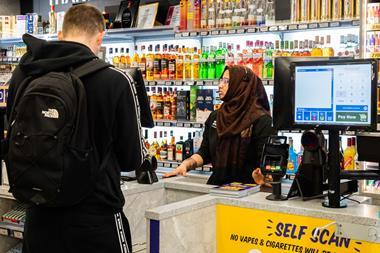


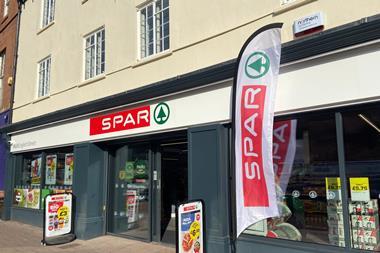
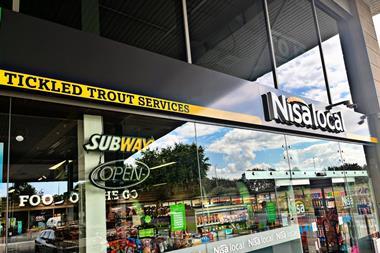


No comments yet